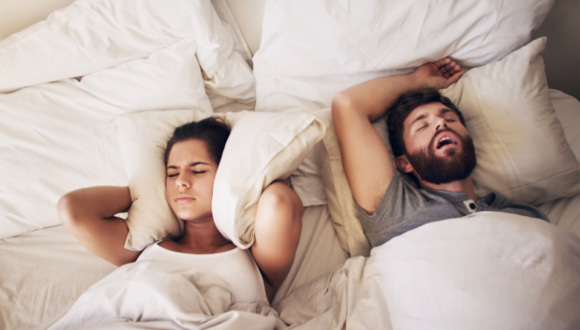Sleep Apnea: More Common (and Serious) than You May Think
Oct. 31, 2019 - Katie McCallumThere are many reasons for a bad night of sleep. Caffeine too soon before bed, a late night at work, street noise, jet lag — and the list goes on. Then there’s sleep apnea, which causes more than just one or two nights of bad sleep.
Sleep apnea is a sleep disorder in which a person’s breathing is repeatedly interrupted throughout the night. For some people, apnea can interrupt sleep as often as 30 times in a single hour (which is about every other minute).
Don’t worry, though! Your brain notices and wakes you up, often with a body jerk or gasp for air, but these frequent interruptions in sleep — night after night — can take a huge toll on your overall health.
“We know that not getting enough sleep can impact a person’s entire life, including his or her mental and physical well-being,” says Dr. Clinton Doerr, a pulmonologist at Houston Methodist. “If you’re tired all the time, you will have a hard time focusing at work and at home, so it’s important to find out the cause.”
Sleep apnea: why it happens
The most common form of sleep apnea, obstructive sleep apnea, occurs when muscles at the back of your throat relax to a point that they fail to keep your airway open — interrupting breathing.
“Your brain quickly notices you’re not breathing,” says Dr. Doerr. “It senses the lack of oxygen and stimulates you to gasp or cough, helping to restore breathing.”
But, this means your body is awakened numerous times throughout the night. In fact, in severe cases of sleep apnea, a person is roused out of sleep a few hundred times per night — leading to very poor sleep.
A second type of sleep apnea, called central sleep apnea, occurs when the brain fails to properly control your breathing during sleep. This type of sleep apnea is much less common.
How you know you might have sleep apnea
It can be hard to know if you have sleep apnea. After all, you’re asleep when it happens — and many people don’t notice or remember episodes of apnea.
“Most individuals finally seek medical advice because their loud or frequent snoring is disrupting someone else’s sleep, like a bed partner or roommate,” says Dr. Doerr.
But there’s more to sleep apnea than just snoring. If you think you might have sleep apnea, ask yourself these questions:
- Do I wake up feeling exhausted, even after a full night’s sleep?
- Do I wake up with a dry mouth, sore throat or headaches?
- Am I unusually sleepy throughout the day?
- Am I overweight?
- Is my mood all over the map?
If you answered yes to these questions, talk to your doctor about your symptoms and ask about your risk for sleep apnea.
Many people with sleep apnea are undiagnosed
Sleep apnea is more common than you probably think. The National Sleep Foundation reported that sleep apnea likely affects as much as 20% of the population, and it’s been found that around 85% of individuals with sleep apnea don’t know they have it.
Part of this may be because the symptoms of sleep apnea are somewhat general. It can be especially challenging to diagnose sleep apnea when the classic signs, such as being overweight or snoring loudly, are absent.
“Sleep apnea is particularly under-diagnosed in women, since they don’t always show the classic symptoms,” says Dr. Doerr. “They’re not always loud snorers, they don’t always gasp for air while asleep and many aren’t overweight.”
It’s also easy to just ignore the signs and symptoms and not mention them to your doctor.
“Many people think being tired is just a part of a busy life, so they don’t mention it to their doctor. What they may not realize is that missing sleep affects more than your energy level the next day — much more,” says Dr. Doerr.
Sleep apnea leads to more than just bad sleep
Sleep apnea can be a potentially serious sleep disorder with enormous long-term impacts on your health. Aside from feeling tired during the day, sleep apnea can increase your risk for:
- High blood pressure
- Heart attack
- Metabolic syndrome
- Nonalcoholic fatty liver disease
- Stroke
- Type 2 diabetes
“In addition, sleep apnea sometimes causes loud snoring which can keep others who share a room (or house) with you from getting a good night’s rest,” says Dr. Doerr.


